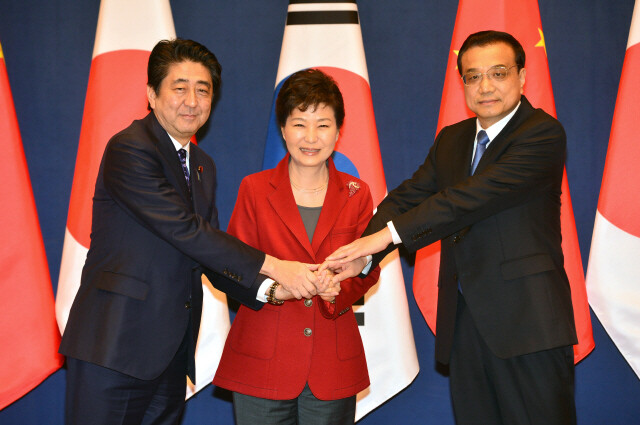hankyoreh
Links to other country sites 다른 나라 사이트 링크
S. Korea, China and Japan hold first trilateral summit since 2012

South Korea, China and Japan stated that they “oppose any action that may cause tension on the Korean Peninsula or violate relevant UN Security Council resolutions.” In addition, they promised to work together to improve bilateral relations and to foster trilateral cooperation “in the spirit of facing history squarely and advancing towards the future.” But during the joint press conference, the leaders of these three countries betrayed subtle differences in their attitudes toward the key issues of historical conflict and North Korea‘s nuclear program.
On the afternoon of Nov. 1, President Park Geun-hye, Japanese Prime Minister Shinzo Abe, and Chinese Premier Li Keqiang held the sixth trilateral summit at the Blue House in Seoul, where they adopted the Joint Declaration for Peace and Cooperation in Northeast Asia.
The joint statement, which totaled 56 paragraphs, had five major headings: realizing peace and cooperation in Northeast Asia, expanding economic and social cooperation for co-prosperity, promoting sustainable development, enhancing trust and understanding among the peoples, and contributing to regional and international peace and prosperity.
During the trilateral summit on Sunday - held for the first time since May 2012 - the three leaders said that, as of this meeting, “trilateral cooperation has been completely restored.”
In regard to circumstances on the Korean Peninsula, the three leaders “reaffirmed that maintaining peace and stability on the Korean Peninsula as well as in Northeast Asia is in our common interest.”
“We reaffirmed our firm opposition to the development of nuclear weapons on the Korean Peninsula, and shared the view that international obligations and commitments under all relevant UN Security Council resolutions and the 19 September 2005 Joint Statement must be faithfully implemented,” they also said.
“I hope that this summit will be a catalyst that will further strengthen cooperation and exchange among the three countries and also contribute to improving bilateral relations among them,” Park said during a joint press conference that was held after the summit meeting.
“I hope that the three countries will agree about the general approach of simultaneously tackling political security and economic development by completely resolving historical issues and walking side by side and that they will create an environment for dialogue, cooperation, and stable development,” Li said.
“It is a major achievement that the three countries affirmed the need to work together to take concrete action to [bring about] the denuclearization of the Korean Peninsula and to ensure that North Korea refrains from provocative action and abides by UN Security Council resolutions and the six-party joint talks,” Abe said.
However, the three leaders revealed differences of opinion about the issue of North Korea and its nuclear program as well as historical issues such as the so-called comfort women, who were sex slaves for the imperial Japanese army. “For reasons that we all know, the process of trilateral cooperation has been obstructed over the past three years. A shared understanding of historical issues is a prerequisite for mutual trust,” Li said in a comment apparently aimed at Abe.
The three leaders also made plain the differences in their attitudes toward the nuclear question. “I made a strong appeal to Park and Li to resolve the issue of Japanese citizens abducted by North Korea,” Abe told the press. In contrast with Park and Abe, however, Li did not even bring up the nuclear issue.
By Choi Hye-jung and Lee Je-hun, staff reporters
Please direct questions or comments to [english@hani.co.kr]

Editorial・opinion
![[Column] Has Korea, too, crossed the Rubicon on China? [Column] Has Korea, too, crossed the Rubicon on China?](https://flexible.img.hani.co.kr/flexible/normal/500/300/imgdb/original/2024/0419/9317135153409185.jpg) [Column] Has Korea, too, crossed the Rubicon on China?
[Column] Has Korea, too, crossed the Rubicon on China?![[Correspondent’s column] In Japan’s alliance with US, echoes of its past alliances with UK [Correspondent’s column] In Japan’s alliance with US, echoes of its past alliances with UK](https://flexible.img.hani.co.kr/flexible/normal/500/300/imgdb/original/2024/0419/2317135166563519.jpg) [Correspondent’s column] In Japan’s alliance with US, echoes of its past alliances with UK
[Correspondent’s column] In Japan’s alliance with US, echoes of its past alliances with UK- [Editorial] Does Yoon think the Korean public is wrong?
- [Editorial] As it bolsters its alliance with US, Japan must be accountable for past
- [Guest essay] Amending the Constitution is Yoon’s key to leaving office in public’s good graces
- [Editorial] 10 years on, lessons of Sewol tragedy must never be forgotten
- [Column] A death blow to Korea’s prosecutor politics
- [Correspondent’s column] The US and the end of Japanese pacifism
- [Guest essay] How Korea turned its trainee doctors into monsters
- [Guest essay] As someone who helped forge Seoul-Moscow ties, their status today troubles me
Most viewed articles
- 1[Column] The clock is ticking for Korea’s first lady
- 2[Correspondent’s column] In Japan’s alliance with US, echoes of its past alliances with UK
- 3After 2 months of delayed, denied medical care, Koreans worry worst may be yet to come
- 4[Column] Has Korea, too, crossed the Rubicon on China?
- 5[Editorial] When the choice is kids or career, Korea will never overcome birth rate woes
- 6Samsung barricades office as unionized workers strike for better conditions
- 7US exploring options for monitoring N. Korean sanctions beyond UN, says envoy
- 8US overtakes China as Korea’s top export market, prompting trade sanction jitters
- 9[Photo] Smile ambassador, you’re on camera
- 10Hong Se-hwa, voice for tolerance whose memoir of exile touched a chord, dies at 76